Intimidation Continues Against Family Of Murdered Teen
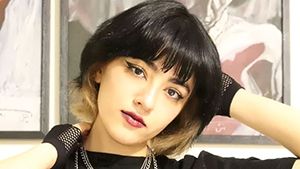
The family of Nika Shakarami, a 16-year-old abducted and murdered by security forces last year, continues to face state intimidation one year after her tragic death.

The family of Nika Shakarami, a 16-year-old abducted and murdered by security forces last year, continues to face state intimidation one year after her tragic death.
On Wednesday, her sister, Aida, disclosed that the security situation around her sister's grave has deteriorated over the past week, reporting having been victim of threats from unidentified individuals warning that if they visit Nika's grave, her mother Nasrin could face arrest.
Additionally, she revealed the Ministry of Intelligence has reluctantly permitted Nika's anniversary ceremony to proceed on Friday, contingent on the absence of violence.
Nika's final communication with a friend last September revealed that security forces were pursuing her on Keshavarz Boulevard in Tehran, after which she mysteriously disappeared. Her body, allegedly subjected to torture, abuse, and beatings by security forces, was identified by her family ten days later.
Later, the government agents seized Nika's body from Khorramabad and buried her secretly in a village in Lorestan, located in western Iran.
Over 500 civilians died in the wake of the uprising which followed the death in morality police custody of Mahsa Amini, including children and teens such as Nika.
Nika's family is not alone in suffering state intimidation. Just last week, Mahsa Amini's family were warned not to commemorate the anniversary of her death on September 16, closing access to the graveyard and arresting her father multiple times, including on the anniversary itself.
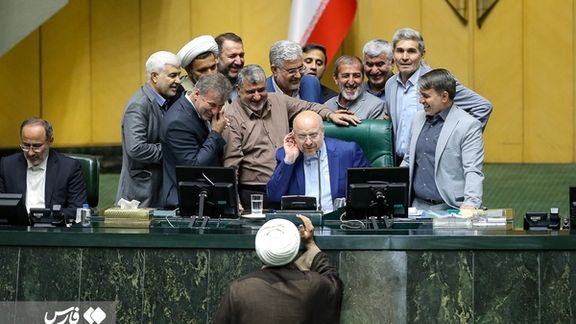
The Iranian parliament has approved a controversial hijab bill aimed at tightening pressure on women who defy the mandatory dress code in public.
On Wednesday, Parliament Speaker Mohammad-Bagher Ghalibaf announced that the bill was approved for a "three-year trial run" following coordination and a written confirmation by the judiciary.
The contentious bill's content was finalized by a committee of approximately 10 lawmakers making the best use of an obscure regulation known as Article 85. The only aspect voted upon was the duration for the trial implementation. During the Wednesday session, 152 MPs voted in favor, 34 voted against, and seven abstained.
Article 85 of the constitution enabled the parliament to effectively sideline opposition by restricting discussions on the bill to an internal committee. Under normal circumstances, the parliament cannot delegate its legislative authority. However, in necessary cases -- through Article 85 -- it can assign an internal committee to draft specific laws. The committee's decisions are then sent to the Guardian Council, whose members are chosen by Supreme Leader Ali Khamenei. If the council deems the decisions to be in line with the Constitution, they can be implemented in the country for a specified period as determined by the parliament.
Initially comprising only 15 articles, the "Hijab and Chastity" bill was sent to the Islamic Consultative Assembly by the administration of Ebrahim Raisi. It has since expanded to include 70 articles. The bill was proposed after months of nationwide protests following the death of Mahsa Amini, a 22-year-old woman who died in police custody last year, allegedly for breaching hijab rules.
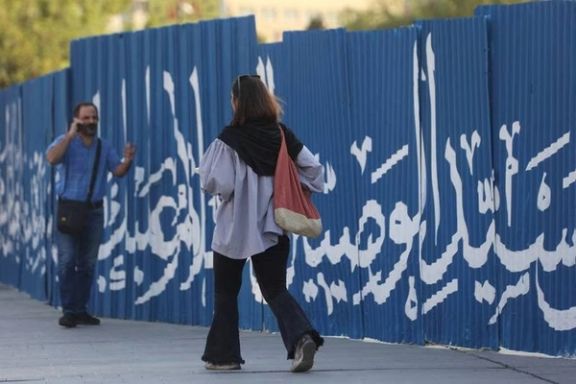
The bill outlines a wide range of punishments and penalties for individuals who defy hijab laws or even criticize compulsory hijab rules, whether online or offline. Even mocking the hijab on social media or elsewhere is subject to specific fines, and offenders may face a ban on leaving the country for up to two years. Additionally, various organizations, including the state broadcaster, are mandated to regularly report on their "duties" related to hijab enforcement to the parliament, interior ministry, or the Supreme Council of the Cultural Revolution.
The approval of the legislation comes amid mounting concerns raised by human rights experts and organizations who argue that the Islamic Republic is employing the bill as a tool for systematic discrimination against women and girls, with the aim of coercing them into unwavering compliance with the government's dictates.
Legal experts say the hijab bill violates not only civil rights but also the Constitution and requires vast resources beyond the government’s means.
Human rights advocates have warned that the bill's implementation could lead to “increased violence, harassment, and arbitrary detentions of women and girls in Iran.” Both the United Nations Human Rights Commission and the UN's Independent International Fact-Finding Mission on the Islamic Republic of Iran have issued statements this month expressing their concerns over the potential consequences of this bill on the rights and freedoms of Iranian women.
“The legislation proposes increased fines and prison terms for women and girls found in breach of mandatory veiling provisions. It also proposes harsher punishments including travel bans, vehicle confiscations, the denial of education and public services, including medical facilities, and sanctions against businesses,” read the statement by the fact-finding mission.
The uprising sparked by the death in police custody of Mahsa Amini in September 2022 has made it increasingly difficult for the clerical regime to enforce the mandatory Islamic dress code. Since the beginning of the ‘Women, Life, Freedom’ movement, tens of thousands of girls and women have shed their compulsory hijab. The regime seeks to criminalize hijab defiance, but no branch of government wants to solely shoulder the responsibility for complications of such a provocative and risky action in society.
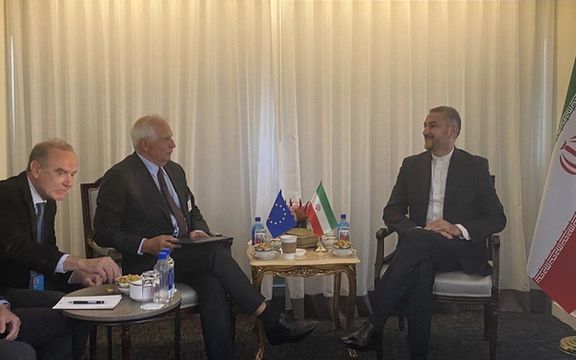
The EU's top diplomat strongly condemns the arbitrary detention of numerous EU citizens, including those with dual nationality, in Iran.
During a meeting held on Tuesday on the sidelines of the UN General Assembly in New York with Iranian Foreign Minister Hossein Amir-Abdollahian, Josep Borrell, the EU's Foreign Policy Chief, raised critical concerns regarding EU-Iran bilateral relations and the latest developments concerning the JCPOA nuclear agreement.
Borrell reiterated his call for the immediate release of all EU citizens in Iranian custody. In a statement released on the EU's official website, the bloc emphasized that its stance remains unchanged regarding the deeply troubling human rights situation within Iran.
"Iran must ensure the preservation of fundamental freedoms, as articulated by all 27 EU Member States on the anniversary of Mahsa Amini's tragic death."
Regarding the JCPOA, Borrell stressed the importance of pursuing a path of de-escalation. He urged Iran to reconsider its decision to revoke the official status of around one third of the International Atomic Energy Agency (IAEA) inspectors in Iran and to enhance its cooperation with the watchdog.
On Saturday, Iran withdrew the designation of several inspectors tasked with verifying activities in Iran under the Non-Proliferation Treaty Safeguards Agreement. Rafael Grossi, the Director General of the IAEA, stated, “This profoundly regrettable decision by Iran is another step in the wrong direction and constitutes an unnecessary blow to an already strained relationship between the IAEA and Iran in the implementation of the NPT Safeguards Agreement."
Borrell also expressed his strong belief in the necessity of seeking a diplomatic resolution to the Iran nuclear issue within the framework of the JCPOA and once again urged the Iranian government to cease its ongoing military cooperation with Russia in the unlawful war of aggression against Ukraine.

Israel’s ambassador to the United Nations was the only diplomat to protest at President Ebrahim Raisi’s speech Tuesday but was escorted away by security.
While Ebrahim Raisi, the man known as the ‘Butcher Of Tehran’ for his history of gross human rights violations, was addressing the UN with an onslaught of regime propaganda including claiming the country is an “unparalleled” beacon of women’s rights, Israel’s ambassador to the UN was physically escorted off site for protesting Raisi’s presence.
Ambassador Gilad Erdan held a poster calling for women’s rights in Iran, showing the face of Mahsa Amini, the face of the Woman, Life, Freedom movement after her death in morality police custody last year, and was forcefully removed from the United Nations by security.
Erdan was the only member of the UN General Assembly to protest. In contrast, in March, more than 100 diplomats from 40 Western countries and allies including Japan walked out of a speech by Russian Foreign Minister Sergei Lavrov to the top UN human rights forum in protest over Russia's invasion of Ukraine. The boycott by envoys from the European Union, the United States, Britain and others left only a few diplomats in the room including envoys from Syria, China and Venezuela.
Soon after, in April, the United States, Britain, Albania and Malta walked out on Russia's envoy for children's rights, Maria Lvova-Belova, who the International Criminal Court wants to arrest on war crimes charges, as she spoke by video to UN Security Council members.
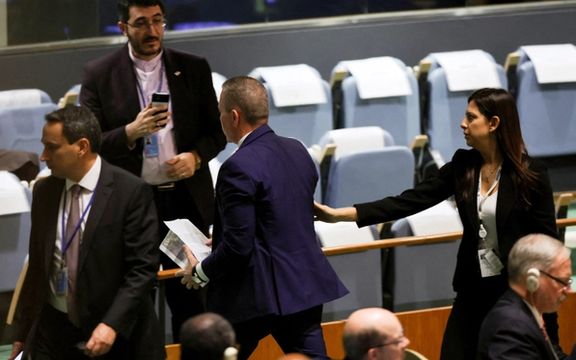
Emboldened, Raisi - who as a prosecutor, took part in the 1988 mass executions that killed some 5,000 political prisoners in Iran - told the UN on Tuesday that the United States should prove its "goodwill and determination" to revive Tehran's 2015 nuclear pact as months of indirect talks between the long-time foes have led nowhere. This was after he publicly stated that the US should "stop interfering in the countries of the Persian Gulf and other regions in the world and mind their own business".
Raisi was speaking on the back of a prisoner swap which saw five US convicted Iranians exchanged for five wrongly held US-Iranian citizens, in addition to $6bn in frozen Iranian funds freed up from South Korea.
In a show of appeasement to the barrage of criticism levied to the Biden administration for the deal, which critics say opens the door to yet more hostage diplomacy by Iran, putting further Americans at risk, the administration levied more sanctions on seven individuals and four entities in Iran, China, Russia, and Turkey for their roles in Iran's UAV and military aircraft development.
However, while Raisi was addressing the world’s leaders, Russia’s Defence Minister, Sergei Shoigu, who is in Tehran, announced that “relations between Russia and Iran in the field of defense are developing dynamically. The number of meetings at different levels has increased. The relationship is developing well,” suggesting the $6bn in released funds will be used to fund the regime’s military and nuclear development.
Raisi is reveling in the PR potential of the visit as the world watches. Only Monday, on the sidelines of the UN General Assembly, he denied sending weapons to Russia, in spite of extensive evidence otherwise which has led to multiple nations including the US and UK, issuing sanctions against Iran.
While the Russian defense minister speaks of burgeoning ties from Tehran, Raisi said from New York, “We are against the war in Ukraine”, while evidence has also shown the two nations building munitions factories together in Russia.
Despite the global backlash for Raisi’s welcome in the UN, the Council of Foreign Relations (CFR) has gone ahead with its invitation to meet with him in New York. Iranian actress and rights activist Nazanin Boniadi, a member of CFR, refused to attend the private meeting.
“Some say that these meetings allow us to hold the feet of dictators to the fire, but the past 44 years have shown us that not only are these meetings futile, the Islamic Republic also uses them to legitimize themselves on the global stage,” she wrote on X.
“Continuing the same practices and expecting tyrants to change their behavior seems completely irrational,” she added. “Democratic institutions hold the key to tipping the balance of power in favor of those risking everything for freedom. If you afford your members the opportunity to meet dictators behind closed doors, then at least offer them the chance to also hear from their opponents in the open.”
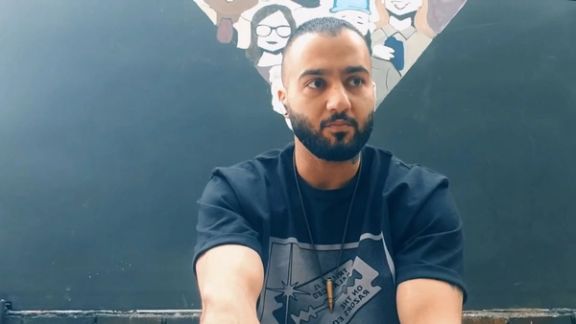
Toomaj Salehi, the Iranian rapper jailed for his protest music, is facing deteriorating health conditions and is in urgent need of medical attention.
Salehi's official account reported on Tuesday that he has sustained injuries from torture during his time in detention, including severe swelling and bleeding in his eyes, a fractured tooth, and injured fingers.
The message further stated, "Now that his legal trial has concluded, he finds himself unjustly incarcerated, enduring days behind bars under intense pressure and control without basic prisoner rights. It is crucial to take swift action to secure his medical release and transfer to a hospital to address his urgent medical needs. Delays in addressing this critical matter must be avoided."
In July, Salehi dodged a death sentence and was instead sentenced to over six years in prison. He was convicted of offenses related to "corruption on earth," which includes violations of religious morality.
Following the tragic death of Mahsa Amini in police custody in September, Salehi was among the young Iranians who took to the streets to protest.
The security forces' crackdown on the protest movement led to the loss of almost 600 lives and the unlawful detention of nearly 20,000 individuals, according to activists. After sham trials, the judiciary imposed harsh sentences on protesters, including the death penalty.
Salehi, 33, is primarily known for his protest songs addressing social issues and government injustices in Iran. He was arrested on October 30th as part of a broader crackdown on opposition figures in response to mass uprisings across the country.
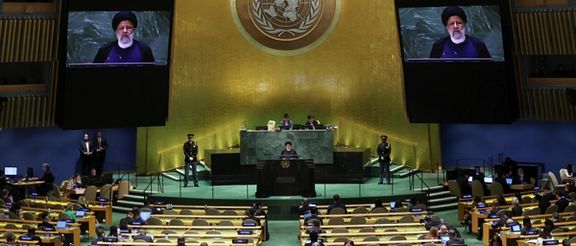
President Ebrahim Raisi blamed foreign countries for waging a propaganda campaign against the Islamic Republic in his UN General Assembly speech Tuesday.
He avoided the topic of the 2022 anti-regime protests almost entirely and referred to it only indirectly as the West’s worst media assault in history.
Raisi was speaking only a few days after the first anniversary of the killing of Mahsa Amini, which sparked widespread protests across Iran beginning in September 2022.
More than 500 were killed, 22 thousand arrested and at least 7 executed in the brutal crackdown that followed.
“The previous year was a year of victory for the Iranian people,” Raisi claimed brazenly, spinning last year’s events in Iran in the most spectacular fashion.
Images coming out of Iran last week, told a very different story: thousands of armed security forces and plain-clothes thugs had been stationed all over the capital Tehran, in anticipation of protests on the anniversary, intimidating passersby and preventing any gatherings in the streets.
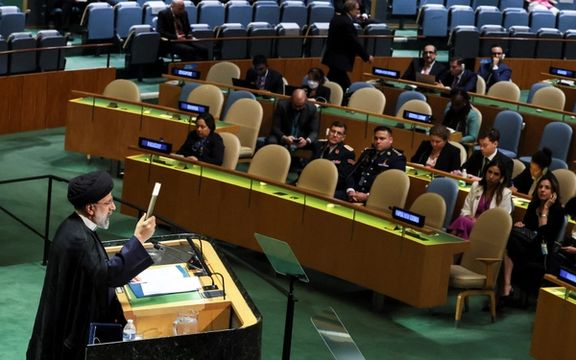
Raisi also lambasted the United States for ‘breaking a promise’ and leaving the JCPOA. He repeated the claim that Iran’s nuclear program is purely peaceful, despite accumulating well over 100 kilograms of uranium enriched to 60 percent.
"The Iranian nation prides itself on playing, thanks to the Islamic Revolution, the biggest role in unmasking the imperialists in the East and West," Raisi said, while the regime has supplied hundreds of kamikaze drones to Russia and exports more than million barrels of oil to China daily at discounted prices.
"The world is transitioning into a novel international order, and the project to Americanize the world has failed," he claimed.
Despite Iran's 12-year involvement in Syria's civil war and supply of weapons to Houthi forces in Yemen, Raisi said, “Our unambiguous position as the Islamic Republic: We do not stand nor support any war anywhere, not in Europe nor anywhere,”
On Monday, the UN nuclear chief said he had asked to meet Raisi on the sidelines of the General Assembly to try to reverse Iran’s decision to remove monitoring devices set up by IAEA and expel “a very sizable chunk” of the agency’s inspectors.
Rafael Grossi, Director of UN's International Atomic Energy Agency, warned that such measures make it impossible for IAEA to verify the nature of Iran's nuclear program.
Earlier on Tuesday, Iranian Americans opposed to the Islamic Republic held a rally ahead of Raisi’s appearance outside the UN headquarters in New York City.
The protesters had banners and posters portraying the Islamic regime's crimes in its 45-year history – including messages targeting Raisi and his role in those crimes.
Raisi was a member of the infamous Death Committee which oversaw summary execution of at least two thousand Iranian political prisoners in 1988.






